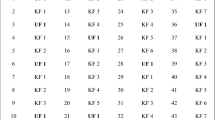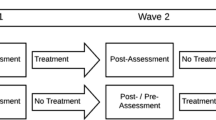Abstract
This study examined the utility of brief academic assessments to identify effective generalization procedures for individual students. Specifically, the study built on the proposal that brief assessments of antecedent and consequence manipulations can identify the most effective generalization strategy for individual students. The design was an alternating treatments design nested within a multiple baseline across six students. Students learned how to solve a set of multiplication facts using a common strategy while spontaneous generalization to other sets of facts was measured. Next, researchers determined whether an antecedent- or consequent-based generalization strategy would be more effective for increasing generalization across multiplication skills and conducted an extended analysis with an alternating treatment phase to confirm results of the brief assessment. Results indicated that the assessment correctly identified the most effective generalization strategy for five of the six students.


Similar content being viewed by others
References
Alessi, G. (1987). Generative strategies and teaching for generalization. The Analysis of Verbal Behavior, 5, 15–27.
Ayllon, T., Kuhlman, C., & Warzak, W. J. (1983). Programming resource room generalization using lucky charms. Child & Family Behavior Therapy, 4(2), 61–67. doi:10.1300/J019v04n02_06.
Burns, M. K., & Wagner, D. (2008). Determining an effective intervention within a brief experimental analysis for reading: A meta-analytic review. School Psychology Review, 37(1), 126–136.
Carnine, D. (1980). Preteaching versus concurrent teaching of the component skills of a multiplication algorithm. Journal for Research in Mathematics Educations, 11(5), 375–379. Retrieved from http://www.jstor.org/stable/748628.
Cooper, J. O., Heron, T. E., & Heward, W. L. (2007). Applied behavior analysis (2nd ed.). Upper Saddle River, NJ: Pearson Education.
Daly, E. J, I. I. I., Bonfiglio, C. M., Mattson, T., Persampieri, M., & Foreman-Ya, K. (2006). Refining the experimental analysis of academic skills deficits: Part II. Use of brief experimental analysis to evaluate reading fluency treatments. Journal of Applied Behavior Analysis, 39(3), 323–331. doi:10.1901/jaba.2006.13-05.
DuVall, T. D., McLaughlin, T. F., & Sederstrom, G. C. (2003). The differential effects of skip counting and previewing on accuracy and fluency of math facts with middle school children with learning disabilities. International Journal of Special Education, 18(1), 1–6. Retrieved from http://www.internationalsped.com/documents/ACFFE.doc.
Fennell, F. M., Altieri, M. B., & Silver Burdett Ginn Firm. (1998). In mathematics the path to math success!. Parsippany, NJ: Silver Burdett Ginn.
Freeland, J. T., & Noell, G. H. (2002). Programming of maintenance: An investigation of delayed intermittent reinforcement and common stimuli to create indiscriminable contingencies. Journal of Behavioral Education, 11(1), 5–18. doi:10.1023/A:1014329104102.
Galbicka, G. (1994). Shaping in the 21st century: Moving percentile schedules into applied settings. Journal of Applied Behavior Analysis, 27, 739–760. doi:10.1901/jaba.1994.27-739.
Haring, N., & Eaton, M. (1978). Systematic instructional procedures: An instructional hierarchy. In N. G. Haring, T. C. Lovitt, M. D. Eaton, & C. L. Hansen (Eds.), The fourth R: Research in the classroom (pp. 23–40). Columbus, OH: Merrill.
House, S., Duhon, G., Hastings, K., & Linden, S. (2009). Using generalization ratio to determine the amount of generalization between early literacy skills. Poster presented at American Psychological Association conference, Toronto, Canada.
Kirby, K., & Bickel, W. (1988). Toward an explicit analysis of generalization: A stimulus control interpretation. The Behavior Analyst, 11, 115–129.
Lloyd, J., Saltzman, N. J., & Kauffman, J. M. (1981). Predictable generalization in academic learning as a result of preskills and strategy training. Learning Disability Quarterly, 4(2), 203–216. Retrieved from http://www.jstor.org/stable/1511005.
McIntyre, S., Test, D., Cooke, N., & Beattie, J. (1991). Using count-bys to increase multiplication facts fluency. Learning Disability Quarterly, 14(2), 82–88. Retrieved from http://www.jstor.org/stable/1510516.
Mesmer, E., Duhon, G., & Dodson, K. (2007). The effects of programming common stimuli for enhancing stimulus generalization of academic behavior. Journal of Applied Behavior Analysis, 40(3), 553. doi:10.1901/jaba.2007.40-553.
Mong, M. D., & Mong, K. W. (2012). The utility of brief experimental analysis and extended intervention analysis in selecting effective mathematics interventions. Journal of Behavioral Education, 21(2), 99–118. doi:10.1007/s10864-011-9143-8.
Noell, G. H., Freeland, J. T., Witt, J. C., & Gansle, K. A. (2001). Using brief assessments to identify effective interventions for individual students. Journal of School Psychology, 39, 335–355.
Noell, G., Roane, H., VanDerHeyden, A., Whitmarsh, E., & Gatti, S. (2000). Programming for communication in the classroom following an assessment of skill and performance deficits. School Psychology Review, 29(3), 429–442.
Rhode, G., Morgan, D., & Young, K. (1983). Generalization and maintenance of treatment gains of behaviorally handicapped students from resource rooms to regular classrooms using self-evaluation procedures. Journal of Applied Behavior Analysis, 16(2), 171. doi:10.1901/jaba.1983.16-171.
Shinn, M. R. (Ed.). (1989). Curriculum-based measurement: Assessing special children. New York: The Guilford Press.
Stokes, T. (1992). Discrimination and generalization. Journal of Applied Behavior Analysis, 25(2), 429–432. doi:10.1901/jaba.1992.25-429.
Stokes, T., & Baer, D. (1977). An implicit technology of generalization. Journal of Applied Behavior Analysis, 10(2), 349. doi:10.1901/jaba.1977.10-349.
Stokes, T., & Osnes, P. (1989). An operant pursuit of generalization. Behavior Therapy, 20(3), 337–355. doi:10.1016/S0005-7894(89)80054-1.
Weinstein, G., & Cooke, N. (1992). The effects of two repeated reading interventions on generalization of fluency. Learning Disability Quarterly, 15(1), 21–28. Retrieved from http://www.jstor.org/stable/1510562.
Author information
Authors and Affiliations
Corresponding author
Rights and permissions
About this article
Cite this article
House Rich, S.E., Duhon, G.J. Using Brief Academic Assessments to Determine Generalization Strategies. J Behav Educ 23, 401–420 (2014). https://doi.org/10.1007/s10864-014-9212-x
Published:
Issue Date:
DOI: https://doi.org/10.1007/s10864-014-9212-x




